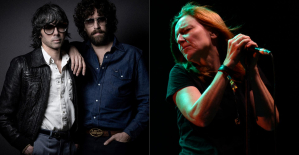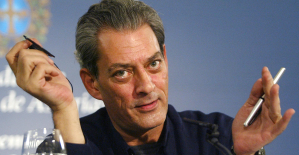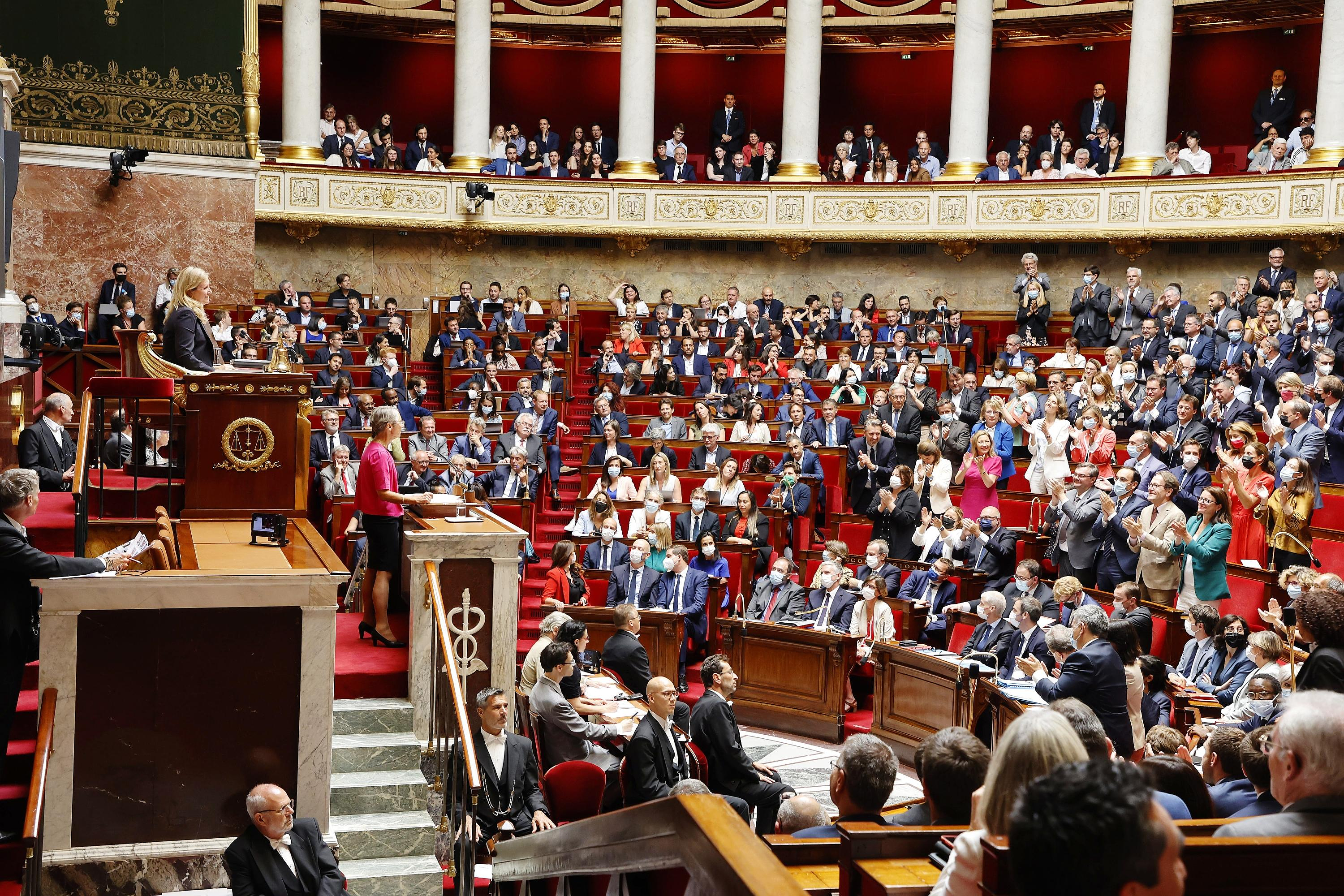The writer Milan Kundera died in Paris on Tuesday July 11 at the age of 94, announced Czech television, then Gallimard editions on Wednesday morning. "Unfortunately, I can confirm that Mr. Milan Kundera has died (...) following a long illness," Anna Mrazova, spokesperson for the Milan Kundera Library, told AFP in her statement. hometown of Brno.
Renowned worldwide for a work translated into forty languages, Kundera was in many ways a mysterious writer. As biographical information, he simply stated: “Milan Kundera was born in Czechoslovakia. In 1975, he moved to France. To complete this note, the diarist Matthieu Galey left a fuller portrait of Kundera: “The accent gives him an infinite charm and those blue eyes, so deep in the socket. Something from a boxer, and from the pope. Warm, protective. Give physical confidence. The opposite of his books.
Born April 1, 1929 in Brno, Czechoslovakia to a musicologist and pianist father, the novelist was first a poet. His life as a writer is of course intertwined with literature, but also with the history of a century which saw communism crumble after having dominated the consciousness of a large part of the European intelligentsia. A drama that will be the foundation of the vocation of Milan Kundera who published his first novel La Joke in 1967. Hailed by Louis Aragon, who wrote the preface when the book was published in France in 1968 (“this novel that I consider to be a major work”), this powerful work in a baroque and very spirited style explores, through the destiny of male and female characters, one of the fundamental themes of his work: the dramatic and comic confrontation between the intimate life of the individual, its elusive and random character and the fiction of a collective ideology, in this case communism Stalinist. A heartbreak that the author experienced from within and which, in a way, decided the course of his life.
An enthusiastic communist since the age of 18, when he joined the party after it seized power in Czechoslovakia after the Second World War, Milan Kundera quickly realized the imposture of the socialism of State, which curbs the consciences, in particular that of the writers and the intellectuals by forcing them to write in a dead language; that of an authoritarian and leveling regime that Kundera would later describe as kitsch for its enthusiastic heaviness and its thundering stupidity. He recounts this disillusionment in The Joke, in which one of the main characters, the young Ludvik, will be expelled from the party for having written on a postcard sent to a friend: "Optimism is the opium of the human race. The sane mind stinks of bullshit. Long live Trotsky”. Kitch is not for Kundera, who will take up this leitmotif of liberating disillusion in all his novels, the characteristic of a particular ideology. It is the tendency that we can all have to embellish the human condition and to deny its tragic dimension in order to make it bearable. “I too was in the round. It was in 1948, the communists had just triumphed in my country and I was holding hands with other communist students. Then one day, I said something that was not necessary, I was expelled from the party and I had to get out of the circle," he wrote in The Book of Laughter and Forgetting, the first of his novels published in France in 1979.
Expelled from the party for the first time in 1956, Kundera was reinstated before being definitively expelled in 1970 after his active participation in the Prague Spring in 1968. Kundera was then a member of the Union of Writers - he took part in the opposition of a regime that will be normalized by Soviet intervention. To be a protester, however, Kundera is not a fashionable sixty-eight libertarian. Contrary to the Parisian pseudo-revolutionary lyricism which claimed to make a clean sweep of the past, the Prague movement defended European culture and its traditions threatened by the summary materialism of the pseudo-scientific ideology in power. After having published Risibles amours (1971) La Valse au adieux (1976) and Life is elsewhere (1973) which will earn him the award of the Medici foreign prize, Milan Kundera affirms that he no longer wants to write.
But his admirers and friends persuaded him to continue and invited him to France in 1975. He went to teach at the University of Rennes, and in 1981, François Mitterrand granted him French nationality - at the same time as Julio Cortazar. Soon he chose Paris as his “second hometown”. In 1984, he enjoyed great success with The Unbearable Lightness of Being, in particular thanks to the adaptation in 1988 of his novel to the cinema by Philip Kaufman and Jean-Claude Carrière. A novel inspired by the Nietzschean theme of the refusal of the spirit of heaviness and which explores the conflict that can exist, in each of us, between the desire for authenticity and the duty of lucidity. How to love without being fooled, of oneself and of the other? If love and eroticism form a large part of the fabric of his novels since The Joke, it is because love is a test of truth that allows no escape.
Libertinism and romanticism thus compete for the soul of Kunderian characters in search of identity and who seek, through the other, the revelation of their own truth. Marked in particular by authors reluctant to any form of metaphysical certainty such as Kafka, Robert Musil, the author of The Man Without Qualities or Witold Gombrowicz, the creator of Pornography and Ferdydurke, Kundera is also influenced by the spirit of the 18th century. French century and in particular by Diderot which will inspire him a play Jacques and his Master, tribute to Denis Diderot in 1981. He also claims the intuition of Nietzsche for whom "love is a long conversation" between individuals of gender opposites that a certain misunderstanding will always separate but that an erotic friendship can reconcile.
Kundera's novels are all inhabited by the obsession with insignificance without yielding to the nihilistic despair of a Cioran. Authentic love is also of this world, the writer reminds us in one of his last novels L'Identité (2003), but it is a matter of spiritual asceticism and perhaps also of an art form. If his work has been hailed by great foreign writers such as Philip Roth or John Updike and supported in France by Philippe Sollers, Alain Finkielkraut or Bernard-Henri Levy, some critics have deplored Kundera's "French turn" and consider his books to be become talkative and too loaded with rhetoric.
In response to its detractors, Milan Kundera, who has not given an interview since 1985, maintained that the novel, precisely because it is a total art, can integrate various forms which may be essays, theater or philosophical digression. Thus in his novel Immortality published in 1990 he brings Goethe and Hemingway into dialogue. Mastering French perfectly, Kundera will now write directly in this language and will publish La Lenteur in 1993, a novel in which he will sift through his irony the contemporary spirit based on speed and the noisy cult of novelty for novelty's sake.
See also | In 2011, Milan Kundera entered La Pléiade. Our journalist at the literary Figaro Mohammed Aissaoui returned to the event:
If so-called socialist Sovietized societies cultivated the negation of the traditional past, those of Western postmodernity suffer from another scourge: that of a media chatter that never stops as if silence, prayer or simple contemplation had become strange mannerisms. How to live in a world without memory that has fallen prey to spectacle and commercial vulgarity? In one of his last novels, The Feast of Insignificance (2003), Kundera shows how our age, doomed to the dullness of the spirit of seriousness, is "all the funnier for having lost all sense of 'humor".
More than critical of the pseudo-progressivism of modernity, he was at the origin, in 1987, of the review Le Messager européen initiated by Alain Finkielkraut and devoted in particular to dissident writers and thinkers from the Eastern bloc. For Kundera the very idea of Europe was unthinkable without those who, such as Jan Patocka or Vaclav Havel, had been the spearheads of the anti-totalitarian struggle. Neither reactionary nor modernist, the work of Milan Kundera can, in certain respects, be considered as a formidable protest against the "huge conspiracy against the inner life" that Bernanos denounced throughout "the modern world". In a letter to Philippe Sollers published in 1989 Kundera wrote: “There is nothing Voltairian about the predominant discourse these days; the technocratized world hides its coldness under the demagogy of the heart. Threats to culture worried him: "One day all past culture will be completely rewritten and completely forgotten behind its rewriting."
Published in La Pléiade in 2011, his work has achieved recognition that transcends ideological and philosophical divisions. Milan Kundera has won many literary prizes, including the Grand Prize for Literature from the French Academy in 2001, the Cino Del Duca World Prize in 2009 and the National Library of France Prize in 2012. He was rehabilitated by his native country which gave him returned his nationality in 2019. As early as 1991, his novel The Joke had been authorized again in Prague. Kundera had then requested that his royalties be used for the Czech edition of Céline.

 Who was Dror Or, the Israeli father who died as a hostage in the hands of Hamas?
Who was Dror Or, the Israeli father who died as a hostage in the hands of Hamas? “Pay in cash”: at his trial, Donald Trump faced with an embarrassing recording
“Pay in cash”: at his trial, Donald Trump faced with an embarrassing recording Italy: a grandmother accidentally serves a bottle filled with wine to a baby, he has an alcoholic coma
Italy: a grandmother accidentally serves a bottle filled with wine to a baby, he has an alcoholic coma The mysterious skeletons of Hermann Göring's villa
The mysterious skeletons of Hermann Göring's villa Children born thanks to PMA do not have more cancers than others
Children born thanks to PMA do not have more cancers than others Breast cancer: less than one in two French women follow screening recommendations
Breast cancer: less than one in two French women follow screening recommendations “Dazzling” symptoms, 5,000 deaths per year, non-existent vaccine... What is Lassa fever, a case of which has been identified in Île-de-France?
“Dazzling” symptoms, 5,000 deaths per year, non-existent vaccine... What is Lassa fever, a case of which has been identified in Île-de-France? Sánchez cancels his agenda and considers resigning: "I need to stop and reflect"
Sánchez cancels his agenda and considers resigning: "I need to stop and reflect" Health carpooling, this source of savings which arouses the ire of patients and taxis
Health carpooling, this source of savings which arouses the ire of patients and taxis Tesla Model 3, MG4 and Dacia Spring.... With the end of the ecological bonus, these electric cars produced in China are seeing their sales fall
Tesla Model 3, MG4 and Dacia Spring.... With the end of the ecological bonus, these electric cars produced in China are seeing their sales fall For the 2024 Olympics, Airbnb commits to fighting prostitution in its accommodation
For the 2024 Olympics, Airbnb commits to fighting prostitution in its accommodation “Shrinkflation”: supermarkets obliged to alert their customers from July 1
“Shrinkflation”: supermarkets obliged to alert their customers from July 1 The electro of Justice and the echoes of Portishead
The electro of Justice and the echoes of Portishead 1924 Olympic Games: according to his daughter, the hero of Chariots of Fire was “not a bigot”
1924 Olympic Games: according to his daughter, the hero of Chariots of Fire was “not a bigot” The “German Brothel” in Yvelines: an uncertain future for the ruined residence
The “German Brothel” in Yvelines: an uncertain future for the ruined residence The eye of the INA: when Paul Auster visited Bernard Pivot
The eye of the INA: when Paul Auster visited Bernard Pivot Omoda 7, another Chinese car that could be manufactured in Spain
Omoda 7, another Chinese car that could be manufactured in Spain BYD chooses CA Auto Bank as financial partner in Spain
BYD chooses CA Auto Bank as financial partner in Spain Tesla and Baidu sign key agreement to boost development of autonomous driving
Tesla and Baidu sign key agreement to boost development of autonomous driving Skoda Kodiaq 2024: a 'beast' plug-in hybrid SUV
Skoda Kodiaq 2024: a 'beast' plug-in hybrid SUV The home mortgage firm rises 3.8% in February and the average interest moderates to 3.33%
The home mortgage firm rises 3.8% in February and the average interest moderates to 3.33% This is how housing prices have changed in Spain in the last decade
This is how housing prices have changed in Spain in the last decade The home mortgage firm drops 10% in January and interest soars to 3.46%
The home mortgage firm drops 10% in January and interest soars to 3.46% The jewel of the Rocío de Nagüeles urbanization: a dream villa in Marbella
The jewel of the Rocío de Nagüeles urbanization: a dream villa in Marbella Facing Jordan Bardella, the popularity match turns to Gabriel Attal’s advantage
Facing Jordan Bardella, the popularity match turns to Gabriel Attal’s advantage Europeans: a senior official on the National Rally list
Europeans: a senior official on the National Rally list Blockade of Sciences Po: the right denounces a “drift”, the government charges the rebels
Blockade of Sciences Po: the right denounces a “drift”, the government charges the rebels Even on a mission for NATO, the Charles-de-Gaulle remains under French control, Lecornu responds to Mélenchon
Even on a mission for NATO, the Charles-de-Gaulle remains under French control, Lecornu responds to Mélenchon These French cities that will boycott the World Cup in Qatar
These French cities that will boycott the World Cup in Qatar Monaco - Clermont: Minamino cornerstone, Fofana essential, the Clermont defense overwhelmed... The tops and the flops
Monaco - Clermont: Minamino cornerstone, Fofana essential, the Clermont defense overwhelmed... The tops and the flops Gymnastics: two gold medals for the Italian Manila Esposito during the European Championships
Gymnastics: two gold medals for the Italian Manila Esposito during the European Championships Champions Cup: in pain, Leinster beats Northampton and qualifies for the final
Champions Cup: in pain, Leinster beats Northampton and qualifies for the final Liga: Real Madrid crowned champion of Spain after FC Barcelona's defeat in Girona
Liga: Real Madrid crowned champion of Spain after FC Barcelona's defeat in Girona


















